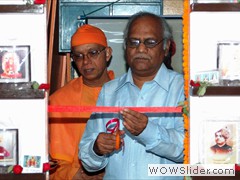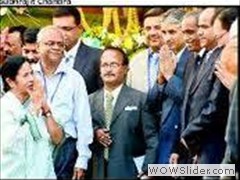Shri Shri Prakash Ex Member Traffic/Ministry of Railway/India shares his experience with Railways
Shri Shri Prakash belongs to IRTS of 1971 examination batch, worked for over 37 years in Indian Railways and finally superannuated as Member Traffic/Railway Board. He has worked in different positions. He not only enjoyed each and every posting but contributed much to the system. A person with very high integrity, no-nonsense man, toughness, daring, visionary, compassion and has worked on the managerial principle that seeing is believing.
It was during his tenure as Member Traffic Railway Board, that Indian Railway shifted complete transparency in punctuality performance, a step which a few can dare with.
He agreed to share his experience with Railways, and I know for certainty that there are many of his personality traits which will benefit the new entrants in Railways. This is what he has to say:-
My Education:
My early education was in Delhi and Kanpur and finally in Allahabad University where I studied science for four years from 1964 to 1968 and took degrees of BSc and MSc. Later I did MBA from University of Hull in UK in 1990.
My career with Railways:
I joined Indian Railway Traffic Service (IRTS) in 1972 and was posted on Eastern Railway. I spent first ten years of my career with railways working in all divisions of than Eastern Railway in Operating Department, though most of my time was spent in Dhanbad, Mughal Sarai and Asansol Divisions. Those were difficult days as industrial climate was pretty bad on Eastern Railway but this also gave me immense confidence in dealing with critical situations which were plenty in those days.
In late 1982, I joined Railway Board as Joint Director (Safety) and later was posted in Traffic Transportation Directorate. In 1986 I went on central deputation to Ministry of Chemicals and Fertilisers as Director for five years. On return from deputation I was posted as CFTM Eastern Railway briefly and then again to Railway Board as Executive Director Traffic Transportation (Movement) where I worked for 5 years from 1991 to 1996.
I spent a year on Northern Railway and then was picked up as Team Leader of Long Range Decision System (LRDSS) Group in Railway Board. On this project, I led a multi-disciplinary group to develop a strategic planning tool for taking strategic decisions.
I worked as DRM of Dhanbad division from 1999 to 2001 and then came to Northern Railway for two years. I also spent a year in TERI engaged in research relating to energy and environment.
I was Chief Administrative Officer of FOIS project for two years and then became first occupant of the post of Advisor Infrastructure in Railway Board. I took over as General Manager Northern Railway in May 2007 and finally retired as Member Traffic in December 2009 after over 37 years of service in Indian Railways. Post-retirement I was appointed as Chairman, Standing High Powered Committee for two years.
Currently I am in TERI as Distinguished Fellow since July 2011 and devote my time in research relating to transport, energy and environment.
How I enjoyed my career:
When I look back at my career two crucial factors strike me. Firstly I was entrusted with challenging assignments at a fairly younger age which gave me not only satisfaction but also equipped me with a lot of confidence and professional experience. Secondly my career was a mix of hard and soft postings which gave me enough opportunity to divert from routine railway work and to pursue research activities.
Indian Railways as an Employer:
I have spent few years outside Indian Railways and spent a considerable period in my career in posts where I had opportunity to have a ringside view of hard-core railway operation. IR is an excellent organisation and gives enough freedom to a manager at all levels to experiment and innovate. The challenges which a railway manager faces in his day-to-day work and amount of responsibility a railway managerial post carries are immense and they give a lot of satisfaction to him. The work at all levels involves coördination with a large number of agencies and people. In key positions which are many in a career there is no time for family, travel and leisure. But one does not crib rather always willing to take such assignments where your worth is recognised and your involvement in work often borders to intoxication.
Railwaymen are highly committed and dedicated:
Dedication and commitment of railwaymen is exemplary. In my long career I have never seen a driver deserting his seat even when faced with imminent collision and certain death. I have always found the driver on his seat trying to stop the train and prevent the collision and finally losing his life in the process. There are thousands of station staff working in remote stations and cabins, in heavy disturbed areas, in areas where even water is not available and spending their entire career in such adverse conditions ensuring timely running of trains. There are many cases where railwaymen lose their lives because of diseases like malaria, tuberculosis and other water-borne diseases acquired during their working hours. The number of trackmen, electrical staff, station staff etc. dying and getting serious injuries during course of work has been quite heavy, much more than in any other industry.
Future of Indian Railways:
Railways are being revived in many countries where they faced neglect and even near extinction earlier, though for this revival a huge capital investment is required. Railways are considered superior than other modes of transport like road and air because of energy efficiency and being environment friendly. However, the edge in energy efficiency and less carbon emission may not help for all time to come for following reasons:
- Technological changes in railways are much slower on account of heavy capital cost involved
- ·On life-cycle basis, source of energy is important for determining emission levels
Indian Railways will have to change structurally to achieve efficiency in all the activities.
Maintenance of integrity and ethical standards:
Indian Railways have been always proud of its officers who maintained a very high degree of integrity and ethical standards. That has been the reason that railway officers at all levels enjoyed a very large degree of discretion in their working which is needed in the achievement of the goals and targets set for them. A lot of working culture is based on verbal orders given on phone where confirmation in writing is never considered a necessity. This is possible only when there is a mutual confidence in each other and both maintain a very high level of integrity and ethical standards. This is the edifice of railway working culture and should not be allowed to be destroyed.
Role of a present day Manager in Indian Railways:
In the present times when obsolescence of knowledge is faster than before, it is very important to acquire new knowledge and learn latest techniques to stay ahead in the competitive world. These are days of knowledge based management and earlier system of vertical control hierarchy may not work for long.
In every position which a railway officer occupies he is a leader. The people working under him look towards him for guidance, assistance and have faith in him. The leader should lead from the front and never fail his people even at the cost of personal inconvenience and loss.
Railelectrica – Thank you very much sir for sparing your valuable time and sharing your thoughts about Railways. I am sure; your words will certainly benefit many in the organisation.
Shri Prakash – Thank you and I wish all the success to Railelectica in its endeavour.
You may also like:
- Technology Update on “Solid Lube Stick Wheel Flange Lubrication System”
- Optimized Algorithms For Effective Driving Of Tap Changer Controlled Electric…
- Electrical Multiple units (Train sets) for higher train speeds on…
- Selection of Suspension Arrangement of Traction Motors : A Right…
- Saga of Traction for Iron Ore Transportation on SE Railway
- Case for compulsory periodic ‘Psychometric Testing’ of loco running staff




 1
1 2
2 3
3 4
4